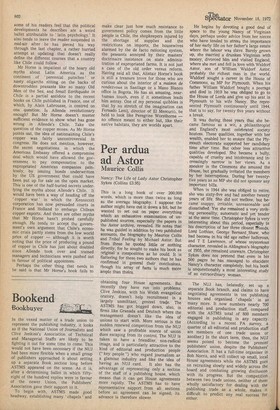Per ardua ad Astor
Maurice Collis
Nancy: The Life of Lady Astor Christopher Sykes (Collins 0.95) This is a long book of over 200,000 words, which is more than twice as long as the average biography. I suppose the author might have cut it down a bit, but he wanted to set out on paper everything which an exhaustive examination of unpublished sources, especially the papers in the Astor archive, revealed. He notes that he was guided in addition by two published accounts, the biography by Maurice Collis and Tribal Feeling by Michael Astor. But from these he quoted little or nothing directly, for he sought to make his book as original a composition as he could. It is flattering for these two authors that he has ronfirmed in general their conclusions, though his array of facts is much more ample than theirs. He begins by devoting a good deal of space to the young Nancy of Virginian days, perhaps under advice from her nieces who have tended to stress the importance of her early life on her father's large estate where the labour was slave. Barely grown up, she married a drunken Virginian with money, divorced him and Visited England, where she met and fell in love With Waldorf Astor, son of William Waldorf Astor, prdbably the richest man in the world. Waldorf sought a career in the House of Commons, as MP for Plymouth. When his father William Waldorf bought a peerage and died in 1919 he was Obliged to go to the House of Lords and give up his seat in Plymouth to his wife Nancy. She represented Plymouth continuously until 1944, that is to say, for twenty five years without a break.
It was during these years that she became famous as a wit, a philanthropist and England's most celebrated society hostess. These qualities, together with her wealth, enabled her to ensure that the Plymouth electorate supported her candidacy time after time. But other less attractive qualities developed. She became a bully, capable of cruelty and intolerance and in, creasingly narrow in her views. As a speaker in the Commons she amused the House, but gradually irritated the members by her interruptions. During 'her twentyfive years as an MP she did not sponsor any important bills.
When in 1944 she was obliged to retire, she was sixty-five and had another twenty years of life. She did not mellow, but became' snappy, irritable, unreasonable and dissatisfied. Yet she remained a very striking personality, autocratic 'and yet tender at the same time. Christopher Sykes is very interesting about this period, espeCially 'in his description of her three closest ?fiends, Lord Lothian, George Bernard Shaw, who had become in his old age rather ludicrous, and T E Lawrence, of whose mysterious character, revealed in Aldington's biography of 1955, she remained unaware. Christopher Sykes does not pretend that even in his 500 pages he has managed to elucidate Nancy's character completely, but his book is unquestionably a most interesting study of an extraordinary woman.


















































 Previous page
Previous page